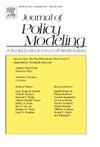金融发展是否改善了东亚经济联盟公共卫生支出对自付医疗费用的影响?
IF 3.1
2区 经济学
Q1 ECONOMICS
引用次数: 0
摘要
为实现可持续发展目标3,即确保健康生活和促进所有人的福祉,必须建立可持续的卫生支出模式。然而,西非经济和货币联盟(WAEMU)国家的特点是医疗保健的自付水平较高。这种情况限制了获得医疗服务的机会,使许多人容易陷入贫困,并偏离了全民健康覆盖的目标。本文通过考虑金融发展,分析了2000-2020年期间WAEMU公共卫生支出对自付医疗费用的影响。利用分位数回归技术对面板数据进行分析,结果表明,公共卫生支出的增加导致医疗保健自付费用的减少。此外,当公共卫生支出与财政发展相互作用时,减少幅度会更大。因此,要提高对家庭卫生支出相关财务风险的防范,就需要建立完善的卫生融资体系,以增加公共卫生支出为目标。旨在进一步发展金融部门的政策可以产生乘数效应,通过公共支出减少医疗保健的自付费用。本文章由计算机程序翻译,如有差异,请以英文原文为准。
Does financial development improve the effect of public health expenditure on out-of-pocket payments for healthcare in the WAEMU?
To achieve Sustainable Development Goal 3, namely to ensure healthy lives and promote well-being for all, it is important to have a sustainable health expenditure model. However, countries in the West African Economic and Monetary Union (WAEMU) are characterized by higher levels of out-of-pocket payments for healthcare. This situation limits access to medical care, makes many people vulnerable to poverty and deviates from the goal of universal health coverage (UHC). This article analyzes the effect of public health expenditure on out-of-pocket payments for healthcare in WAEMU over the period 2000–2020 by taking into account financial development. With the quantile regression technique for panel data, the results show that the increase in public health expenditure leads to a reduction in out-of-pocket payments for healthcare. Moreover, the decrease becomes more significant when public health expenditure interacts with financial development. Thus, improving protection against financial risk related to health expenditure borne by households in the WAEMU requires the establishment of a well-developed health financing system oriented towards an increase in public health expenditure. Policies aimed at further developing the financial sector could have a multiplier effect on the reduction of out-of-pocket payments for healthcare through public expenditure.
求助全文
通过发布文献求助,成功后即可免费获取论文全文。
去求助
来源期刊

Journal of Policy Modeling
ECONOMICS-
CiteScore
6.20
自引率
11.40%
发文量
76
期刊介绍:
The Journal of Policy Modeling is published by Elsevier for the Society for Policy Modeling to provide a forum for analysis and debate concerning international policy issues. The journal addresses questions of critical import to the world community as a whole, and it focuses upon the economic, social, and political interdependencies between national and regional systems. This implies concern with international policies for the promotion of a better life for all human beings and, therefore, concentrates on improved methodological underpinnings for dealing with these problems.
 求助内容:
求助内容: 应助结果提醒方式:
应助结果提醒方式:


